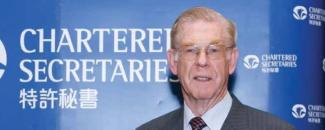In interview with CSj, the Institute of Chartered Secretaries and Administrators (ICSA) President Frank Bush FCIS discusses the new structure of ICSA Council and the organisation's aspirations to become the leading global professional body in governance.
ICSA Council was restructured in March last year – do you think the new structure is working well?
'Yes. I think we are still getting used to the full implications of the new structure, but the general spirit on the reformed Council is very constructive and we are working very well together. I think everybody is determined not to forget the lessons of the past, but we do not want fight the old battles – we want to look forward rather than back.'
Does the restructuring of the Council reflect a change of direction for the ICSA?
'Yes, a total change of direction. Council is responsible for the future of the ICSA and it needs to identify our strategic plans and start down the path of implementing them. That's the process that we have started on. Now that there is no major block on Council, now that no one is looking over our shoulders, we have a great deal more freedom and responsibility.
The ICSA, as a global body, is no longer blurred with its UK operations which was the case before. There were always arguments about where the dividing line between the ICSA and the UK, Republic of Ireland and Associated Territories (UKRIAT) operations lay – now it is clear what the UKRIAT responsibilities are and what the ICSA Council should do. That has provided much better accountability and much better transparency.'
Could you explain the dispute between the divisions and the UK that eventually led to the ICSA's new
strategic direction?
'In December 2011, we had two meetings with two entirely opposing objectives. The first meeting was called by a group of UK members which wanted to create a unitary institute without any of the divisions. There was a group of people in the UK who wanted the UK to run the whole thing. If their proposal had been followed, there would have been no committee here in Hong Kong, for example, there would not have been a separate entity here at all as all the orders would have come from London.'
But that would have needed an entirely new agreement between the divisions and the UK.
'Yes, they wanted to have the delegation agreements rewritten. I don’t think that they ever really thought through how they were going to implement this effectively. They seemed to assume that they would be able to dismantle the divisions with the existing workforce remaining employed, but answering to London instead of to a local committee.
But the second meeting I mentioned was the meeting requisitioned by the divisions to remove the UK's voting block on Council. The first meeting was abandoned and there was a question about whether the second meeting had proceeded validly. Fortunately common sense prevailed. A number of people within the UK decided that this state of affairs could not continue. They came to talk to the divisions to see what common ground could be found and that worked. We agreed on a way forward which led to the recent changes to the charter and the byelaws.
Since the reforms, an awful lot of rancour and suspicion has fallen away. We now have a good platform to go forward and that has been evident in the two Council meetings since the reforms were adopted. We now have a cooperative and a very positive atmosphere.'
How will the delegation of powers to the divisions work in practice?
'The ICSA is an umbrella body. It has a ruling Council which sets policy but which doesn’t interfere in the day-to-day management of the divisions. The divisions write their own exams and admit their own members under their delegated powers. Council is responsible for activities that cover more than one division or that have a global impact. So Council is responsible for the relationship with supra-national bodies like the World Bank and the OECD, but it is not responsible for the relationship with the Hong Kong or Chinese government – that is the responsibility of the China division.'
And financially?
The divisions are responsible for their own financial affairs. The budgeting system is still not quite finalised, but effectively the Council will rely on the divisions for the money it needs to carry out its activities. It will have a three-year rolling budget which will be reviewed every year. That will give the divisions some certainty about the cost of Council – we haven’t had that in the past because UKRIAT acted as the banker.'
The latest ICSA Council meeting has just taken place here in Hong Kong, what strategies and plans were discussed?
'The final form of the strategic plan has yet to be agreed, but the underlying principles have been accepted. They are based on a number of things. Firstly, there is a recognition that not all of our members are company secretaries. The composition of our membership varies from division to division, but our members fulfill quite a diversity of roles in companies and other organisations as well. In the UK, for example, there is a much higher proportion of charitable bodies than there is here in Hong Kong, so more of our members are employed in the charity sector.
We have also found that there are a lot of other professionals who want to become members. There are a lot of lawyers, risk managers, compliance managers, internal auditors, tax people and even directors who find our qualifications have value. We have to recognise those different roles and we can do so by introducing additional subjects to our curriculum that are more oriented towards some of those specific job descriptions. Australia, for example, is in the process of introducing a risk management course.
The second element of strategy is that we need to build our profile, and that's where our relationship with international bodies like the World Bank and the OECD becomes important. We have within our ranks a lot of experience and knowledge on various governance issues that will be of use to these bodies. By raising our profile with them, we will be establishing the importance of the ICSA globally and increasing the value of ICSA membership.
Encapsulating of all of this, we have set ourselves a mission to be the leading global professional body in governance.'
You mention the Australian Division – its decision to change its name to the 'Governance Institute of Australia' has attracted a lot of interest here in Hong Kong and globally. Do you think we'll be seeing other divisions follow suit?
'Firstly, just to be clear, what Australia did was to change the name of its service company – that's a different proposition from the ICSA changing its name. In addition, one needs to bear in mind that it has probably taken Australia five years to complete the process and people probably started talking about it seven or eight years ago.
It is not an operation without risk either. You would need a special resolution and the approval of 75% of those who vote on it. Australia got 80.1 in favour I think. But, as you say, there has been quite a response to Australia's move. What I think will happen next is that the other divisions, who have had the benefit of a presentation at Council by Australia's representatives on this issue, will take that home and consider it very carefully. They will consider what was involved and why it was done, and they will look at some of the risks that were encountered and the steps that were taken to cope or avoid those risks.'
What's your personal view on this – do you think a change of name for other ICSA divisions would be a good thing?
'With certain caveats, yes. We are talking about changing the name of the institutes, not changing the name of the office of its members.'
So members of the profession will still be Chartered Secretaries?
'Yes. That would be important to preserve. In Australia they had to spell out very clearly that that was going to be preserved. That was important and they are still very careful to emphasise that the role and the title of the Chartered Secretary will remain.'
Do you believe a change of name for other ICSA divisions – in particular using the term 'governance' – would be more inclusive of members who are not Chartered Secretaries? 'Yes, provided that people know what it means and what it stands for. That's another part of the exercise. You would have to explain the reason for adopting the new name so that people understand that the organisation isn’t just about the company secretary – it is about other roles and it provides skills and expertise for other roles as well. The feeling in Australia was very strong that by continuing to call ourselves an institute of Chartered Secretaries, we were not representing the interests of all of our members and we were ignoring what was happening in the market. The title focuses on a relative minority.
But I don’t know what the outcome of this process will be. I don’t think that the ICSA would contemplate changing its name unless the divisions start pushing it to do so. I think it will be a bottom- up process.'
Is it a challenge to maintain the same international standards of the Chartered Secretarial qualification when the divisions handle the qualification exams and processes locally?
'The broad parameters of the curriculum are centralised but the implementation is local and that does produce some tensions. The ICSA Professional Standards Committee is comprised mainly of practitioners and some academics – that's a very valuable combination of skills – and it meets twice a year. It looks at samples of the exam papers set in each of the divisions to ensure that the syllabus is properly addressed. It looks at the examiners' guide for each paper to get an understanding of the sort of answers that the examiners are looking for. It also looks at samples of the exam scripts to get an understanding of the way students respond to the exam. It also looks at the way the scripts are marked, to be sure that they are all marked to a similar standard and reasonably fairly.
The aim is to try to ensure that syllabus coverage, the standard of the exams and the standards of marking are reasonably consistent across all of the divisions. That's not an easy process. The divisions don’t always use the same teaching methods and they don’t all produce the same type of teaching materials.'
How do you see the relationship between the ICSA and the Corporate Secretaries International Association (CSIA) going forward?
'The ICSA is qualification body with individual members and the CSIA is grouping of different professional bodies – we need the two of them. The ICSA is a member of the CSIA, together with other ICSA divisions, but there are bodies that are members of the CSIA that can’t come into ICSA – for example the professional bodies in the US and India. Through the CSIA, however, we can get together and discuss common purposes.'
Nevertheless both ICSA and CSIA have set themselves the mission to become the global voice of governance professionals – do you see any clash here?
'No. The CSIA is a very different organisation so there is not a lot of ground for controversy. We want to see them secure their place in the world too. Because we teach, we educate, we would argue that we have a greater body of intellectual property, whereas their mission is much more of an exploration of common purposes.'
There remains a great diversity in the roles adopted by corporate secretaries around the world – do you think corporate secretaries see themselves as being part of a global profession?
'Yes I do and the key word is governance. Although standards will differ from country to country, there is still a global acknowledgement that good governance is a worthwhile standard for all organisations to aim at. It doesn’t matter so much what you call yourself, and the standards of governance vary a lot depending on the level of economic and political development. You will always have those sorts of differences, but the basic principles of governance are still applicable.'
Frank Bush was interviewed in Hong Kong after the ICSA Council meeting on 17-18 October 2014.



